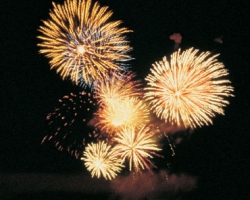As the weather warms and Independence Day approaches, many people may start feeling a familiar urge to blow things up.
Fireworks are as much a part of Fourth of July celebrations as hamburgers and hot dogs. But local law enforcement agencies and the Chula Vista Fire Department are urging South Bay residents to leave the pyrotechnics to the professionals this year, and there is good reason to heed their warnings: fireworks of every stripe are illegal in San Diego County, and Chula Vista Fire Marshall Justin Gipson said it’s best to avoid them in all their forms.
“The simple thing to remember when it comes to fireworks: a ‘no touch’ policy is the way to go,” Gipson said.
It’s not that local agencies are opposed to fun, it’s that even the most benign fireworks can create real dangers, Gipson said. Even the seemingly innocuous hand-held “sparklers” that sometimes find their way to backyard celebrations can lead to serious injury. They burn at temperatures as high as 1800 degrees, hot enough to ignite virtually any material they come into contact with. A stray spark landing on a T-shirt can ruin that barbecue in a hurry, Gipson said.
“We send kids to the emergency room every year,” Gipson said. Nationwide he said, fireworks lead to anywhere from 8,000 to 10,000 hospitalizations annually. Injuries range from missing fingers to serious burns and eye injuries. Risks are compounded in the dry summer heat, Gipson said, when wildfire season is in full swing.
Although all types of fireworks are illegal in San Diego County, that doesn’t stop people from trying to use them.
Public Affairs Officer with the U.S. Customs and Border Protection Agency Jackie Dizdul said thousands of dollars worth of fireworks are confiscated at local border crossings every year around this time.
Because their sale isn’t regulated south of the border, vacationers often unwittingly bring the devices with them, only to be stopped when they try to cross back into the U.S.
Particularly dangerous, said Dizdul, are the homemade fireworks produced as part of a cottage industry in Mexico.
“They can be as simple as a cardboard tube with some gunpowder, newspaper and a fuse … those kinds of fireworks can be unstable if they’re not made properly,” Dizdul said.
Dizdul said in most cases, people crossing the border with fireworks aren’t attempting to smuggle contraband; they may simply be unaware that such items are illegal within the county.
In cases like these, fireworks can be surrendered to officials at the border with no serious consequences. But large caches hidden inside a vehicle, intended for resale in the U.S., aren’t unheard of, Dizdul said.
Smuggling poses a particularly serious threat, because fireworks may be crammed into tight spaces where they can ignite unintentionally.
There have even been instances when caches of illegal fireworks are found inside an engine compartment, a particularly risky place to store them.
Anyone found deliberately smuggling fireworks can be subject to fines and even the confiscation of their vehicles.
The fireworks that do turn up at the border end up in a secure steel box, which is periodically picked up by the Bomb and Arson team at the San Diego County Sheriff’s Department. Sgt. Everard Dayrit said the contraband is rounded up and destroyed at a safe location.















